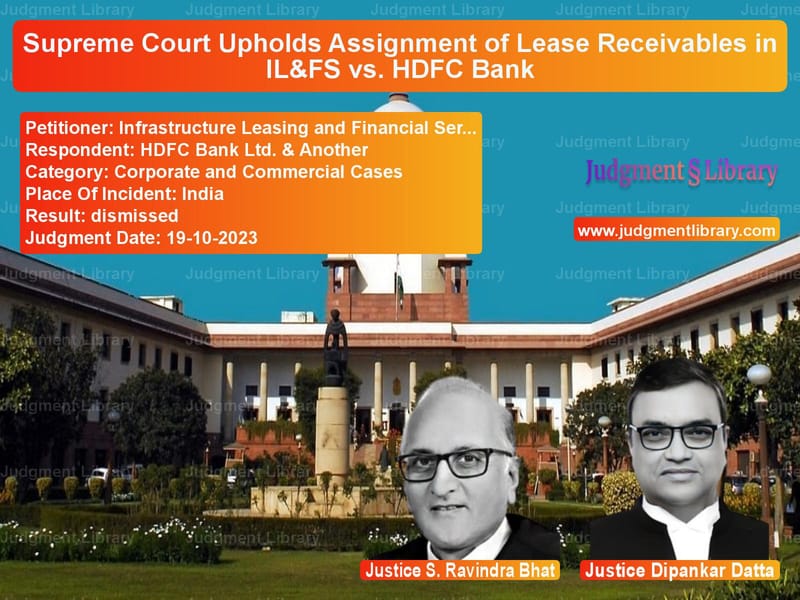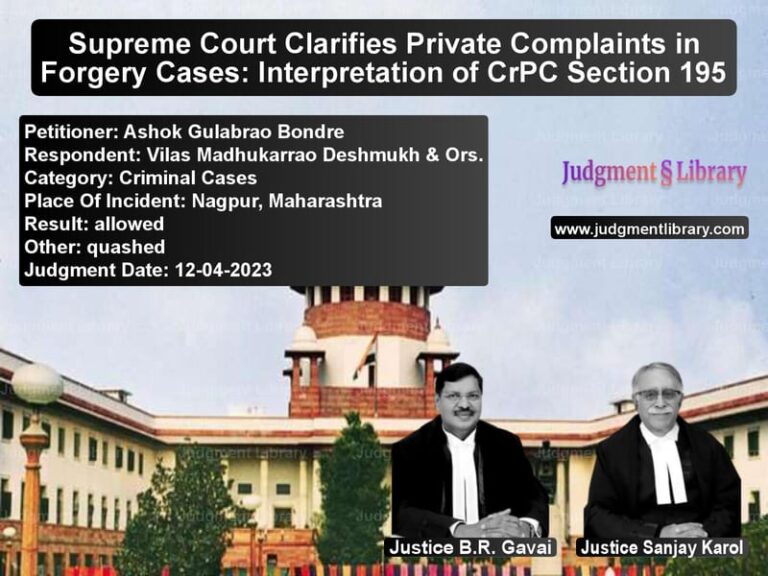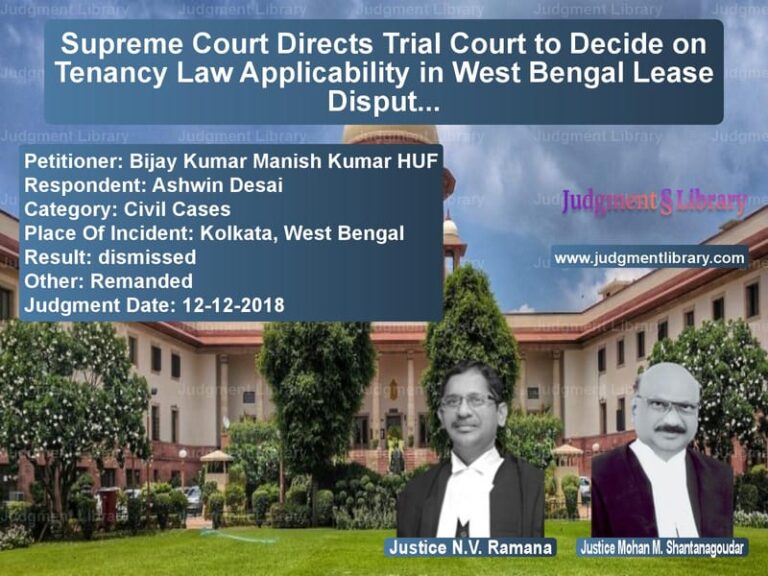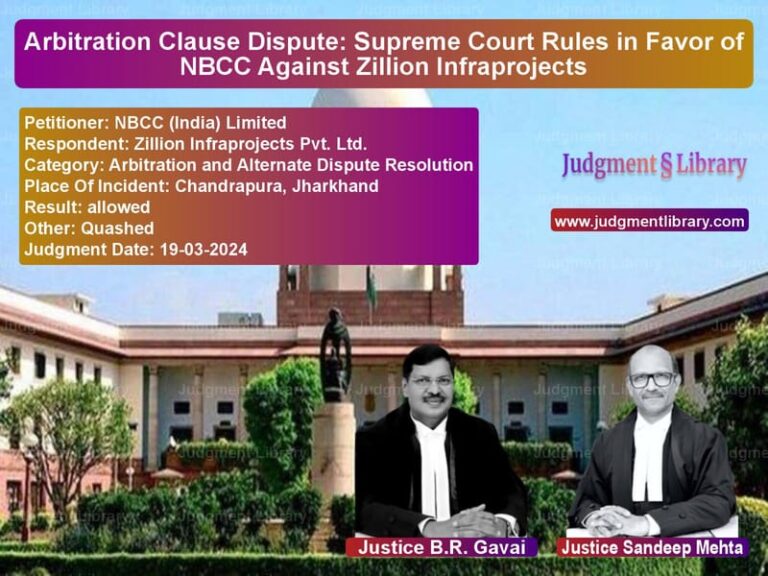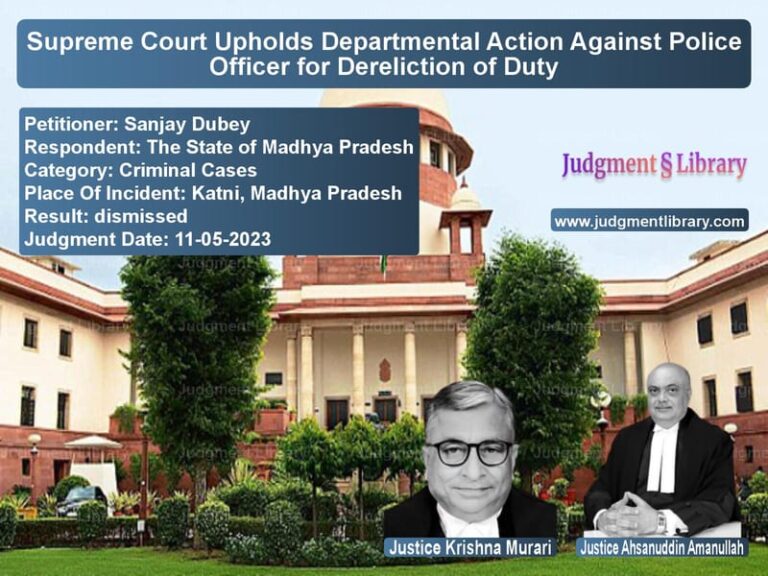Supreme Court Upholds Assignment of Lease Receivables in IL&FS vs. HDFC Bank
The Supreme Court of India recently ruled on the financial dispute between Infrastructure Leasing and Financial Services Ltd. (IL&FS) and HDFC Bank Ltd. concerning the assignment of lease receivables under an escrow arrangement. The judgment provides significant clarity on the nature of assignments in financial transactions and the enforceability of security interests in insolvency proceedings.
Background of the Case
The case involved IL&FS, which had obtained a financial facility of ₹400 crores from HDFC Bank in June 2018. As security for the loan, IL&FS executed several agreements, including:
- A Master Facility Agreement (MFA) specifying repayment terms.
- An Assignment Agreement (AA) transferring a portion of lease receivables to HDFC.
- An Escrow Account Agreement ensuring that rental payments from IL&FS tenants would be deposited into an escrow account.
- A Power of Attorney allowing HDFC to appropriate proceeds directly.
However, in October 2018, IL&FS faced a financial crisis, leading to the intervention of the National Company Law Tribunal (NCLT) and the subsequent National Company Law Appellate Tribunal (NCLAT) proceedings. The NCLAT issued a freeze order preventing creditors from enforcing security interests over IL&FS assets.
Despite this order, HDFC continued to collect lease payments through the escrow mechanism, prompting IL&FS to seek a refund of ₹112.79 crores debited from its accounts. The matter was referred to a retired Supreme Court judge, who ruled that HDFC’s actions violated the NCLAT’s freeze order.
HDFC challenged this ruling, arguing that the assigned receivables were no longer IL&FS’s assets and thus fell outside the scope of the freeze order.
Legal Issues Raised
- Whether the assignment of lease receivables to HDFC constituted a transfer of ownership or merely a security interest.
- Whether the NCLAT’s freeze order applied to assigned receivables.
- Whether HDFC was required to refund the ₹112.79 crores to IL&FS.
Arguments by IL&FS
- The assignment agreement merely created a security interest, not an absolute transfer.
- The receivables remained part of IL&FS’s assets and were thus subject to the NCLAT’s freeze order.
- The Power of Attorney given to HDFC did not override IL&FS’s ownership rights.
- HDFC’s collection of lease payments violated the insolvency moratorium.
Arguments by HDFC
- The assignment agreement transferred ownership of the receivables to HDFC, making them the bank’s exclusive property.
- The escrow arrangement ensured that rental payments went directly to HDFC, bypassing IL&FS’s control.
- The freeze order did not apply to assigned receivables since IL&FS no longer had a proprietary interest in them.
- The transaction was a Lease Rental Discounting (LRD) arrangement, not a traditional loan.
Supreme Court’s Observations
The Supreme Court analyzed the nature of the assignment and the intent behind the agreements. Key observations included:
- The agreements explicitly stated that lease receivables were irrevocably assigned to HDFC.
- The use of terms like “pledge” did not override the clear language of absolute assignment.
- Under the Transfer of Property Act, 1882, actionable claims (such as lease receivables) can be assigned, transferring ownership rights.
- The NCLAT’s freeze order only applied to IL&FS’s assets, and the assigned receivables were no longer IL&FS’s property.
The Court referred to past rulings, including:
- Sunrise Associates v. Government of NCT of Delhi (2006) – Held that rights under a contract can be assigned.
- ICICI Bank v. Official Liquidator of APS Star Industries Ltd. (2010) – Recognized lease rental discounting as a legitimate form of assignment.
- Noor v. G.S. Ibrahim (2003) – Held that assigned debts are enforceable by the assignee.
Final Judgment
The Supreme Court dismissed IL&FS’s appeal, upholding the NCLAT’s decision that:
- HDFC had a valid proprietary right over the assigned receivables.
- The NCLAT’s freeze order did not apply to the assigned receivables.
- HDFC was not required to refund ₹112.79 crores to IL&FS.
Implications of the Judgment
This ruling has significant implications for financial transactions:
- Clarity on Lease Rental Discounting – Confirms that assignments under LRD agreements transfer ownership, not just security interests.
- Strengthens Creditor Rights – Ensures that assigned receivables remain outside the purview of insolvency moratoriums.
- Improves Financial Stability – Encourages structured finance by upholding the validity of assignment agreements.
- Limits Debtor Defenses – Prevents borrowers from using insolvency proceedings to reclaim assigned receivables.
The Supreme Court’s ruling reinforces the enforceability of assignment agreements in corporate finance, ensuring greater protection for lenders.
Petitioner Name: Infrastructure Leasing and Financial Services Ltd..Respondent Name: HDFC Bank Ltd. & Another.Judgment By: Justice S. Ravindra Bhat, Justice Dipankar Datta.Place Of Incident: India.Judgment Date: 19-10-2023.
Don’t miss out on the full details! Download the complete judgment in PDF format below and gain valuable insights instantly!
Download Judgment: infrastructure-leasi-vs-hdfc-bank-ltd.-&-ano-supreme-court-of-india-judgment-dated-19-10-2023.pdf
Directly Download Judgment: Directly download this Judgment
See all petitions in Bankruptcy and Insolvency
See all petitions in Corporate Compliance
See all petitions in unfair trade practices
See all petitions in Judgment by S Ravindra Bhat
See all petitions in Judgment by Dipankar Datta
See all petitions in dismissed
See all petitions in supreme court of India judgments October 2023
See all petitions in 2023 judgments
See all posts in Corporate and Commercial Cases Category
See all allowed petitions in Corporate and Commercial Cases Category
See all Dismissed petitions in Corporate and Commercial Cases Category
See all partially allowed petitions in Corporate and Commercial Cases Category

